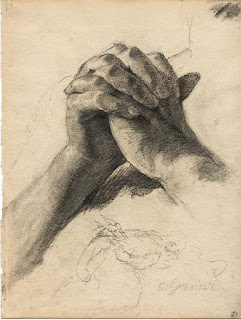Memorial of Saint Jerome,
priest and doctor of the Church
The LORD addressed Job out of the storm and said: Have you ever in your lifetime commanded the morning and shown the dawn its place For taking hold of the ends of the earth, till the wicked are shaken from its surface? The earth is changed as is clay by the seal, and dyed as though it were a garment; But from the wicked the light is withheld, and the arm of pride is shattered. Job 38:12-15
“And as for you, Capernaum, ‘Will you be exalted to heaven? You will go down to the netherworld.’ Whoever listens to you listens to me. Whoever rejects you rejects me. And whoever rejects me rejects the one who sent me.” Luke 10:15-16
Piety
From “A conversation with James Martin, S.J.”
What bricks of faith, hope and love will you put into place today after you are converted in your conversation with the Lord?
The LORD addressed Job out of the storm and said: Have you ever in your lifetime commanded the morning and shown the dawn its place For taking hold of the ends of the earth, till the wicked are shaken from its surface? The earth is changed as is clay by the seal, and dyed as though it were a garment; But from the wicked the light is withheld, and the arm of pride is shattered. Job 38:12-15
“And as for you, Capernaum, ‘Will you be exalted to heaven? You will go down to the netherworld.’ Whoever listens to you listens to me. Whoever rejects you rejects me. And whoever rejects me rejects the one who sent me.” Luke 10:15-16
Piety
From “A conversation with James Martin, S.J.”
[F]irst, just try imagining yourself in
God’s presence. Or sitting beside Jesus. And enjoy it. Then see what happens.
What kind of emotions, feelings, memories, desires, insights arise? What might
be God trying to tell you with these experiences? Or perhaps God just wants you
to enjoy being in the divine presence. Or if you’re a more imaginative person,
why not try Ignatian contemplation? Try to imaginatively “place” yourself in a
scene from the Gospels. Ask yourself, “What do I see? What do I hear? What do I
feel, taste and smell?” And again, see what comes up. Or try lectio divina. Read quietly through a
text and see what God wants you to notice. See where that might take you.
There are a lot of ways to begin to
pray. Try them out. And don’t get too hung up on the methods and “rules” for
each one. Often they overlap. Sometimes people ask: “Am I doing meditation or
contemplation or lectio?” And I say, “You’re praying in your own way.”
Study
The Lord addressed Job. Just think.
The Lord had a conversation with Job just as easily as you and I can
call up our spouse or co-workers. Recently, Fr. James Martin was
interviewed about Jesuit contemplative prayer.
At the heart of the method is putting YOURSELF into a Biblical
story. Just think of being a
fly-on-the-wall as the Lord went head to head with Job, or the Pharisees, or
James and John, or Nicodemus.
In Job, we see his faith shine forth despite all that he has endured. He knows
that his God is a living God. Hope is evident in the belief that Job see the
Lord face-to-face and his whole being is consumed with the “holy longing” for
that moment when he is in the true presence of God.
Yet, even when Jesus is directly in
their midst, he gets rejected. The call to repentance that is a part of the
proclamation of the kingdom brings with it a severe judgment for those who hear
it and reject it.[i] The
rejection in Luke 10 is just a minor foreshadowing of the rejection of the
Passion. The urgency of listening to the
terms of our commissioning becomes evident as Jesus warns that rejection of his
word is rejection of the One who sent Jesus.
Action
Through all the challenges of daily life, the message Jesus delivered is built on the same depth of faith we witness in the life of Job: “The Kingdom of heaven is at hand.” Job experienced profound loss and profound gain. He may have lost his possessions and even his family but he gained a personal relationship with the Lord. Through our faith and good works, we can aspire to experience the same direct “conversation” with the Lord in our prayer life. No matter how much we long for the Kingdom, it is up to us to begin to build that mighty Kingdom, brick-by-holy-brick – careful not to reject any pebble spoken by Jesus.
Through all the challenges of daily life, the message Jesus delivered is built on the same depth of faith we witness in the life of Job: “The Kingdom of heaven is at hand.” Job experienced profound loss and profound gain. He may have lost his possessions and even his family but he gained a personal relationship with the Lord. Through our faith and good works, we can aspire to experience the same direct “conversation” with the Lord in our prayer life. No matter how much we long for the Kingdom, it is up to us to begin to build that mighty Kingdom, brick-by-holy-brick – careful not to reject any pebble spoken by Jesus.
What bricks of faith, hope and love will you put into place today after you are converted in your conversation with the Lord?








